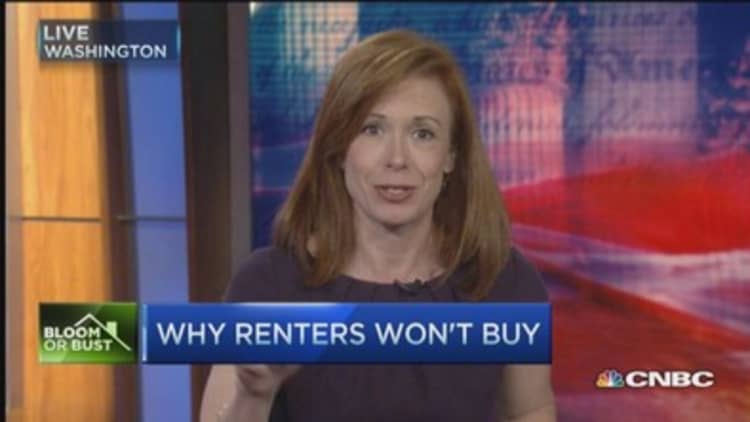
Rents are soaring, and mortgage rates are still historically low, but renters seem less and less inclined to buy, even when homeownership could save them money fast. How fast? Two years, according to Zillow, a real estate sales and analytics company.
While the numbers vary market to market, Zillow found that most homebuyers would be paying less per month to own a home than to rent after two years. It made its calculation by incorporating the costs associated with buying and renting, including upfront payments, closing costs, anticipated monthly rent and mortgage payments, insurance, taxes, utilities, maintenance and even renovation costs .
Amid the nation's 35 largest metropolitan housing markets, Dallas-Fort Worth had the lowest break-even horizon, at 1.2 years. Indianapolis and Detroit were next at 1.3 years. The highest break-even horizons were in Los Angeles at 5.1 years, Washington, D.C., at 4.2 years and San Diego at 3.8 years.
And yet the math isn't moving renters.
"If the buy versus rent decision were about simple math, we'd likely have millions more homebuyers in the market, because the equation is tilted heavily in favor of buying," said Stan Humphries, chief economist at Zillow. "But no matter what the numbers say, buying a home is a huge commitment. Every day, Americans make decisions to buy or rent based on any number of personal dynamics, including preference, flexibility needs, family factors and, yes, financial considerations."
Another survey done in March by mortgage giant Fannie Mae found respondents less inclined than ever to buy a home if they were to move. This may be because people also feel less confident that their financial situation will improve. This dovetails with new numbers from the U.S. Labor Department showing still slow income growth.
Read MoreWeak March jobs may not be crying wolf: Ex-Bush aide
Younger renters, who may in fact want to buy, are struggling to save for a down payment, given their high rents and high level of student loan debt. Of renters surveyed by Zillow, 16 percent said they couldn't qualify for a loan and 13 percent said they didn't have enough for the down payment.
Mortgage credit availability is tight, according to most industry surveys, but some argue that the numbers don't paint an accurate picture. Today's borrowers, they claim, may have higher credit scores, but only because borrowers with lower credit scores generally don't have the means to purchase a home, so they're not even applying. That takes them out of the credit mix.
Read More4 million mortgages that never were: What happened
This also shows up in demand for both new and existing homes—the bulk of which is on the higher end. Home builders say that's where their business is, and that is why they're not building as many cheaper, entry-level homes as they have in the past. On the existing home side, still very tight inventory paints a similar picture. There are so few homes for sale that lower-end owners who may want to move up are not listing, for fear they won't find somewhere else to live, somewhere they can afford.
"It's still a seller's market," said Jonathan Smoke, chief economist at Realtor.com. "Supply is not keeping pace with surging demand. We expect rising prices to persuade those who may be on the fence about listing their homes to do so in the coming months, leading to closer parity between supply and demand."
Home prices, however, will be the key driver. Fast, investor-fueled home price appreciation in 2013 threw a wet blanket on sales in 2014. That's because investors priced themselves out, and regular owner-occupant buyers couldn't afford the new market. As price gains eased toward the end of last year, the hope was that buyers would return; the trouble now is, again, still-short supply buoying prices.
The number of homes for sale grew by just 2 percent from February to March, according to Realtor.com, far below normal spring growth. Fence-sitting sellers may be more inclined to list, but only if they know they can afford the move-up home and only if they feel certain the investment is the right move. If their confidence in both the broader economy and their own personal wealth potential is anything like that of renters, they may continue to ride the fence.



